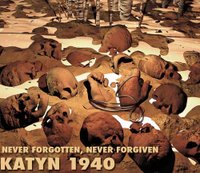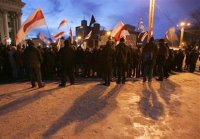 Ukraine may eventually get a new government this week. Seven weeks after the March 26 parliamentary elections, Timoshenko again declares that she stands as victor and new Prime Minister.
Ukraine may eventually get a new government this week. Seven weeks after the March 26 parliamentary elections, Timoshenko again declares that she stands as victor and new Prime Minister. Thus, Timoshenko would reconquer the position she lost last year, by forming a coalition with Yushchenko's Our Ukraine, and Moroz' Socialist Party. In combination, the three parties control 243 out of the 450 seat in the Ukrainian Parliament, the Verkhovna Rada, as opposed to the 186 seat of Yanukovich's Party of Regions.
Whereas such a coalition seems more natural than e.g. an unlikely government between Timoshenko and Yanukovich or Yushchenko and Yanukovich, it would not be an easy path to tread. Rivalries between Timoshenko, Yushchenko, and Moroz have previously led to politicial crises in the aftermath of the Orange Revolution, and this may become a recurrent phenomenon also with a new orange government.
The road map that has led the way to, what could now become a new government, has created a common platform for political action between the three parties. Issues at stake are relations with Russia, WTO-membership, Ukraine's potential accession to Nato, as well as privatisations of state businesses and agriculture. Governemt talks have also been compared to reuniting a family after a lengthy and difficult divorce.
A wild card in negotiations is obviously also ramifications of the new constitution, which entered into force on January 1 this year. Limiting the powers of the president, parliamentary power increases, e.g. by the right to appoint Prime Minister.
According to the current coalition bid, Timoshenko's bloc will get half the ministerial posts, Our Ukraine a third, and the Socialists the remaining cabinet seats. It is also said that Moroz would become Parliament Speaker. How the actual division of the spoils will be in the end, however remains to be seen. Setbacks have been manifold up till now, so a repetition should not be ruled out, although the possibilities for renewed negotiations and solutions are quickly narrowing. According to the constitution, a government must be formed within 60 days of the elections. Today, 53 days have passed since 26 March, leaving a mere week to form a government. Time is simply running out, so the choice is to deal or die.
At the core, coalition talks reflect a struggle between mighty interests over profits from the Ukrainian economy. Despite the progress won by the Orange Revolution, corruption is still endemic to Ukrainian society and politics, and this also applies to the parties that now might form a new government. It is essentially a question of who will get the billions of dollars that end up in the pockets of private interests, not least from the transit of Russian gas to the EU - now controled by the RosUkrEnergo company.
As stakes are so high in getting a "fair" share of these proceeds, there is no wonder that the political struggle is so tough. Thus, forming a new government for these parties means to pay up or lose out on one's cut. To lose is not an option for either of the three parties, which perhaps is the main reason why a government eventually must form. The alternative would be to hand power and proceeds to Yanukovich, which definitely would leave the coalition partners with naught. Barring Yanukovich from power is thus what unites Timoshenko, Yushchenko, and Moroz.
However, there are still a few "buts" before a new government is in place. The greatest obstacle is still Yushchenko's opposition against accepting Timoshenko as Prime Minister. Thus, as news of a government deal became public on Monday, a spokesman of Our Ukraine was quick to declare that the party would suspend talks in response to Timoshenko's statement that she would become Prime Minister and Moroz Parliament Speaker. Instead, Our Ukraine launched an unexpected candidacy of the Socialist leader Moroz as Prime Minister. The rationale would be that parliament might not want to accept Timoshenko as Prime Minister, which then would severely complicate any further possibilities of reaching a common solution.
Our Ukraine's stern reaction was not unexpected. The party has repeatedly characterised Timoshenko's ambitions for the Premiership as an "ultimatum" in negotiations. Sooner or later, however, this is an argument that will not be taken seriously by anyone. The question now is, if the three potential partners have not reached a point of no return in negotiations. Having more or less struck a deal, Our Ukraine can no longer turn its back to agreeing on a solution. With almost two months since elections, the orange forces are reaching a decisive stage in negotiations when they must either unite or part. In the end, Yushchenko must most likely face realities and drink the bitter cup Timoshenko offers him, for the simple reason that he is running out of options. The alternative would be to part from power, if not from the presidency.
It is now becoming painstakingly clear that Yushchenko can no longer perform a play to the gallery, and must admit that he plays too high a game. Now it's do or die - neck or nothing, and Yushchenko must swallow his pride by accepting Timoshenko, while next week might be too late. It remains to see whether Yushchenko will rise to the challenge or extend his role as election loser to that of lame duck as president. It all lies in Yushchenko's hands and how he decides will seal his fate in the history of Ukraine. Time is running out for him to show that he believes in, knows how, and can make a change for his country.
 Ukraine, government, Timoshenko, Yushchenko, Moroz
Ukraine, government, Timoshenko, Yushchenko, Moroz
















 After a press conference in Minsk this morning, Belarus opposition leader and former presidential candidate Alyaksandr Milinkevich was arrested by Belarus police. The arrest was due to an "illegal" demonstration in Minsk on Wednesday to commemorate the 20th anniversary of the Chernobyl accident.
After a press conference in Minsk this morning, Belarus opposition leader and former presidential candidate Alyaksandr Milinkevich was arrested by Belarus police. The arrest was due to an "illegal" demonstration in Minsk on Wednesday to commemorate the 20th anniversary of the Chernobyl accident.






